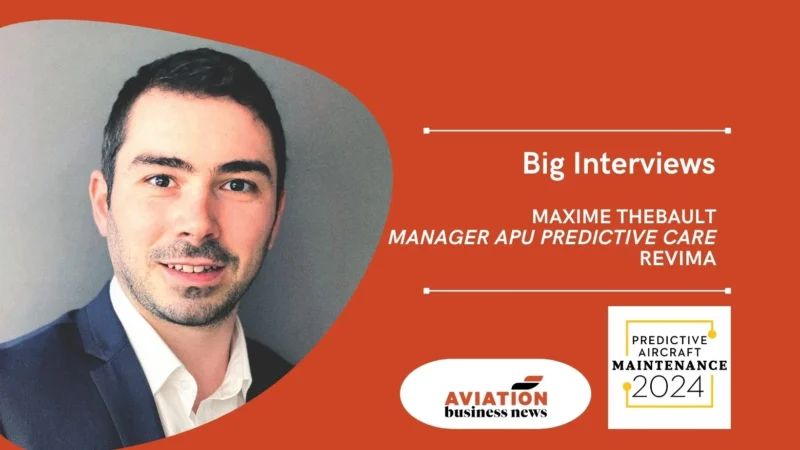In the run-up to MRO Management’s 2024 Predictive Aircraft Maintenance Conference in Dublin on 13-14 November, we asked Maxime Thebault, manager APU Predictive Care at Revima, who will be speaking at the event, his thoughts on the landscape of predictive maintenance.
In what ways do you think predictive maintenance solutions can revolutionise MRO activity?
I believe predictive maintenance can significantly bridge the gap between traditional off-wing MRO activities and on-wing operations.
By leveraging predictive maintenance, we can combine MRO shop expertise with the airline’s experience in aircraft turnaround to enhance the daily operations of our customers.
Airlines can leverage the value of specialised MROs within their supply chain to enhance safety, reduce the number of flights operating under minimum equipment list (MEL) conditions and lower costs by preventing high-cost failures.
Furthermore, MROs can benefit by improving their reactivity, being closer to airline daily operations and gaining a better understanding of their needs.
In the current post-pandemic context, characterised by heavy workloads and spare parts challenges, a key advantage of predictive maintenance is the reduction of unexpected issues for MROs.
Predictive maintenance allows MROs to anticipate incoming work orders rather than dealing with last-minute inductions, thereby enhancing efficiency and planning.
How would you describe the current state of predictive maintenance in the MRO market, and are there any exciting trends shaping its future?
The current state of predictive maintenance in the MRO market is very exciting. Predictive maintenance concepts and solutions are spreading across the industry, and there is widespread trust in their potential. Recognition and trust in MROs as providers of predictive maintenance solutions is increasing.
MROs like Revima have capitalised on their unique knowledge base and have been developing specialised predictive maintenance solutions for years.
In addition to enhancing the historical power-by-the-hour (PBH) offerings, MROs can now provide extended support in operational environments and cover risks such as no fault found (NFF) for airlines.
As technology becomes more accessible, with recent developments such as large language models, more providers – from OEMs to MROs and technology startups – are diversifying their offerings using the currently available data.
Collaborative efforts among these stakeholders are also driving innovation, ensuring that solutions are not only advanced but also integrated seamlessly into existing operations.
What predictive maintenance solutions does Revima offer, and how can these empower your customers?
At Revima, we have specialised in APU MRO for over 60 years, and we bring this extensive shop experience and engineering value to our customers through our ‘APU Predictive Care’ solution.
We assist our customers in monitoring APU conditions and advising on predictive maintenance actions. To achieve this, we utilise a robust and cutting-edge digital platform for gathering aircraft data, running analytics and enhancing our engineering algorithms with machine learning modules.
Our solutions development organisation, FlightWatching by Revima, enables us to be reactive to evolutions at controlled cost. We delve deeply into a specific ATA chapter to maximise our capabilities in this field.
While software and algorithms can provide remarkable insights, we believe that engineers play a crucial role in making the best decisions by combining these insights with real-life experience. Therefore, the core of our predictive maintenance service is engineering support powered by AI.
This approach ensures that we can make predictive maintenance successful for our customers, minimise associated risks and spread benefits throughout the value chain.
What are the primary hurdles the industry must overcome to propel forward with predictive aircraft maintenance?
The key issue is data. It’s not just about ownership, but also making more data available at a reasonable cost. Airlines are at different stages of digitalisation. While newer aircraft gather and share data efficiently, older models that are still widely used present a challenge. Making their data available would be a significant advancement.
Additionally, data security is crucial for expanding data collection. Ensuring accurate and secure data points is essential to avoid incorrect decisions. To fully benefit from predictive maintenance, we need accessible and secure data. Success depends on having a large quantity of high-quality, secure data for AI model training.
How do you foresee predictive maintenance in the MRO industry evolving over the next decade?
In the mid-term, the focus will be on achieving industry-wide adoption of predictive maintenance practices, making it the new norm.
As for the evolution of predictive maintenance capabilities, there are two main trajectories. Firstly, we will enhance predictive algorithms based on current data, developing use cases informed by engineering insights and expanding data collection to cover all known failure modes.
Secondly, there will be a push towards greater intelligence and automation, streamlining processes and deepening our understanding of monitored systems to transition towards prescriptive maintenance. This approach aims not only to detect failures in advance but also to optimise component usage and extend their lifespan.
This evolution will be supported by advancements in connected aircraft and leveraging AI to uncover hidden data correlations based on component engineering knowledge.
Close coordination with MRO work packages will be crucial to integrate predictive and prescriptive maintenance inputs effectively.
This collaboration aims to optimise existing components towards a sustainable future, leveraging advancements in connected aircraft and AI.
This feature was first published in MRO Management – July 2024. To read the magazine in full, click here.
PREDICTIVE AIRCRAFT MAINTENANCE (PAM) CONFERENCE 2024
On 13-14 November, MRO Management and its parent company Real Response Media will host the Predictive Aircraft Maintenance (PAM) Conference 2024 at the Radisson Blu Royal Hotel Dublin, Ireland, bringing together senior level executives from airlines, OEMs, MRO specialists and big data experts to explore the future of predictive maintenance.
Attendees will discover how to get the best out of predictive maintenance while overcoming the greatest challenges. Case studies will highlight best practices and how companies are successfully collaborating with industry partners, while panel discussions will explore the major topics from the perspective of all stakeholders.
Thank you to our Bronze Sponsor, Revima, for supporting PAM 2024.
For more information and to find out how to register to attend, visit predictiveaircraftmaintenance.com

